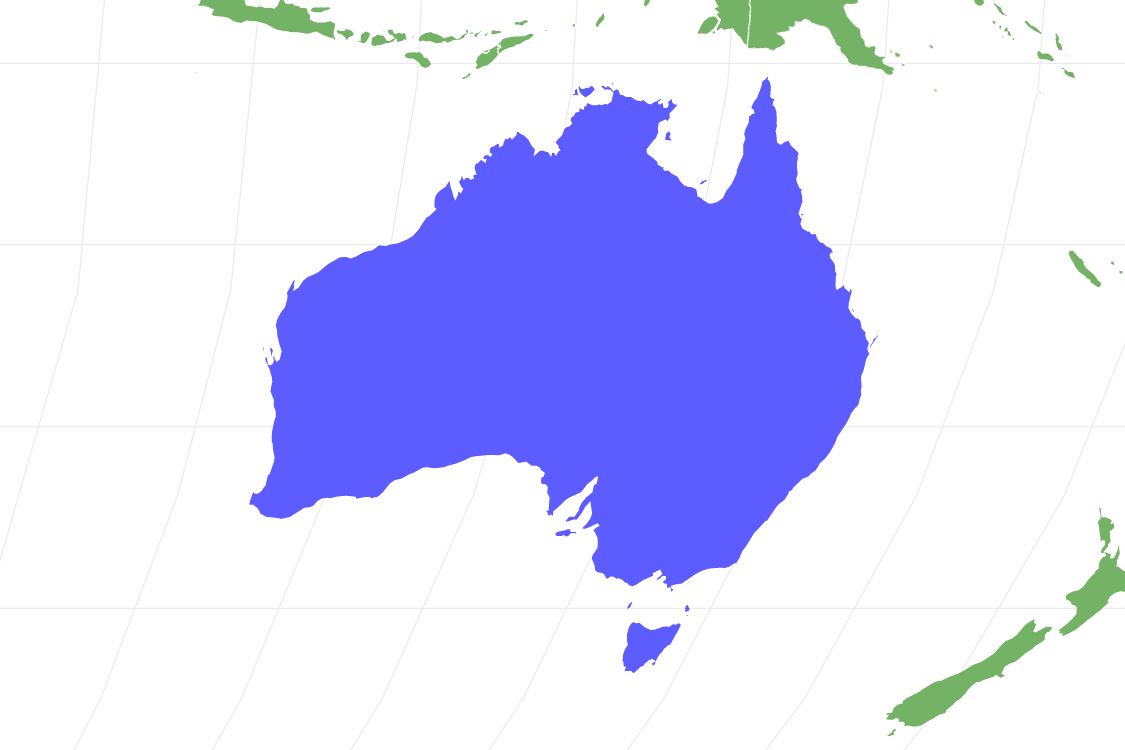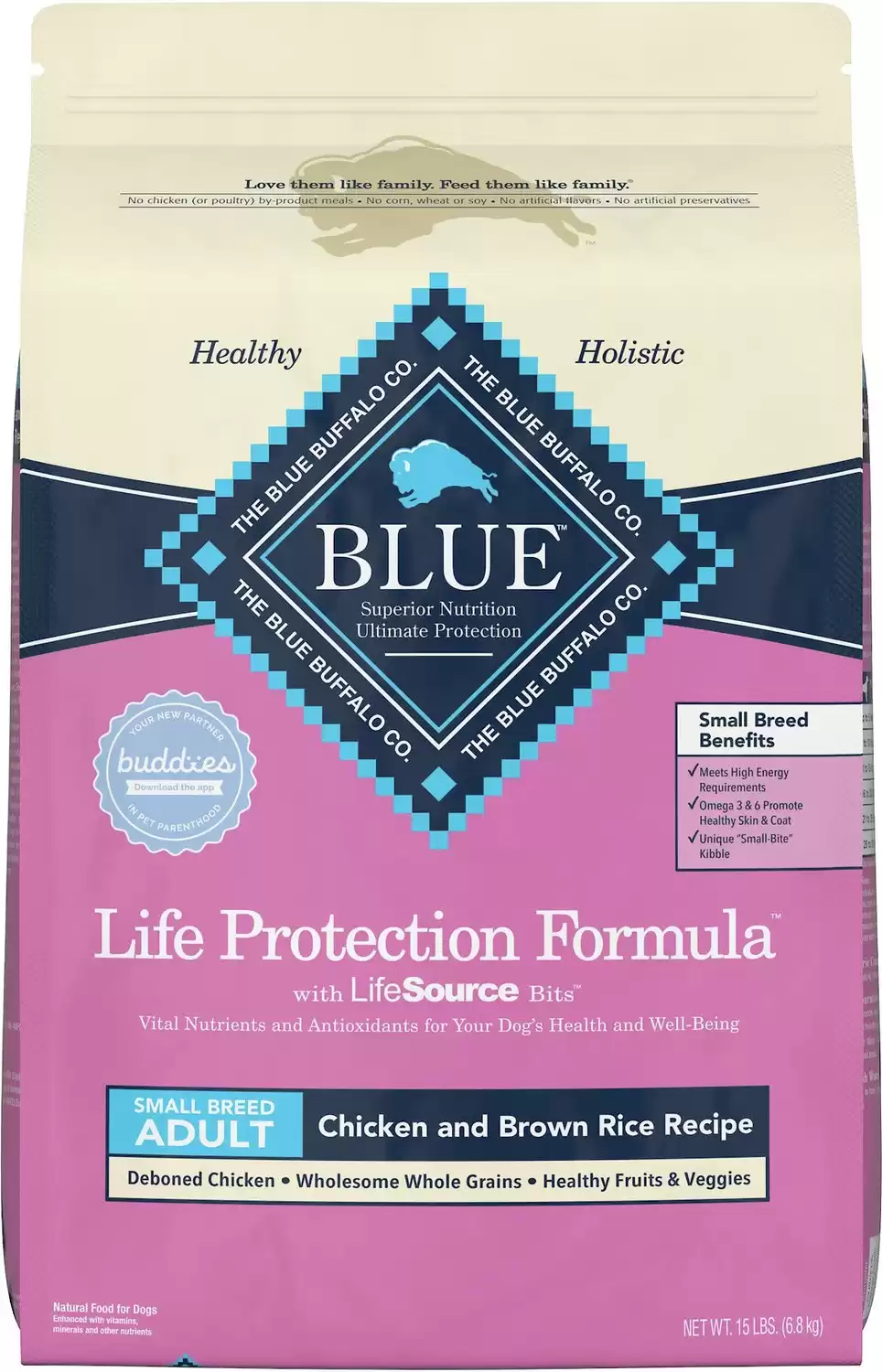Poochon
Canis lupus
The Poochon was first bred in Australia.
Advertisement
Poochon Scientific Classification
- Kingdom
- Animalia
- Phylum
- Chordata
- Class
- Mammalia
- Order
- Carnivora
- Family
- Canidae
- Genus
- Canis
- Scientific Name
- Canis lupus
Read our Complete Guide to Classification of Animals.
Poochon Conservation Status
Poochon as a Pet:
- General Health
- Energy Level
- Shedability
- Trainability
- Intelligence
- Tendency to Chew
- Size
- Family and kid friendliness
- Yappiness / Barking
- Moderate
- Hypoallergenic
- Yes
- Separation Anxiety
- High
- Preferred Temperature
- Average climate
- Exercise Needs
- Low
- Friendly With Other Dogs
- High
- Pure bred cost to own
- $1,000 to $3,000
- Dog group
- Toy
- Male weight
- 6-17 lbs
- Female weight
- 6-17 lbs
This post may contain affiliate links to our partners like Chewy, Amazon, and others. Purchasing through these helps us further the A-Z Animals mission to educate about the world's species.
View all of the Poochon images!
Poochons are a hybrid dog breed that are the result of breeding a Miniature or Toy Poodle with a Bichon Frisé.
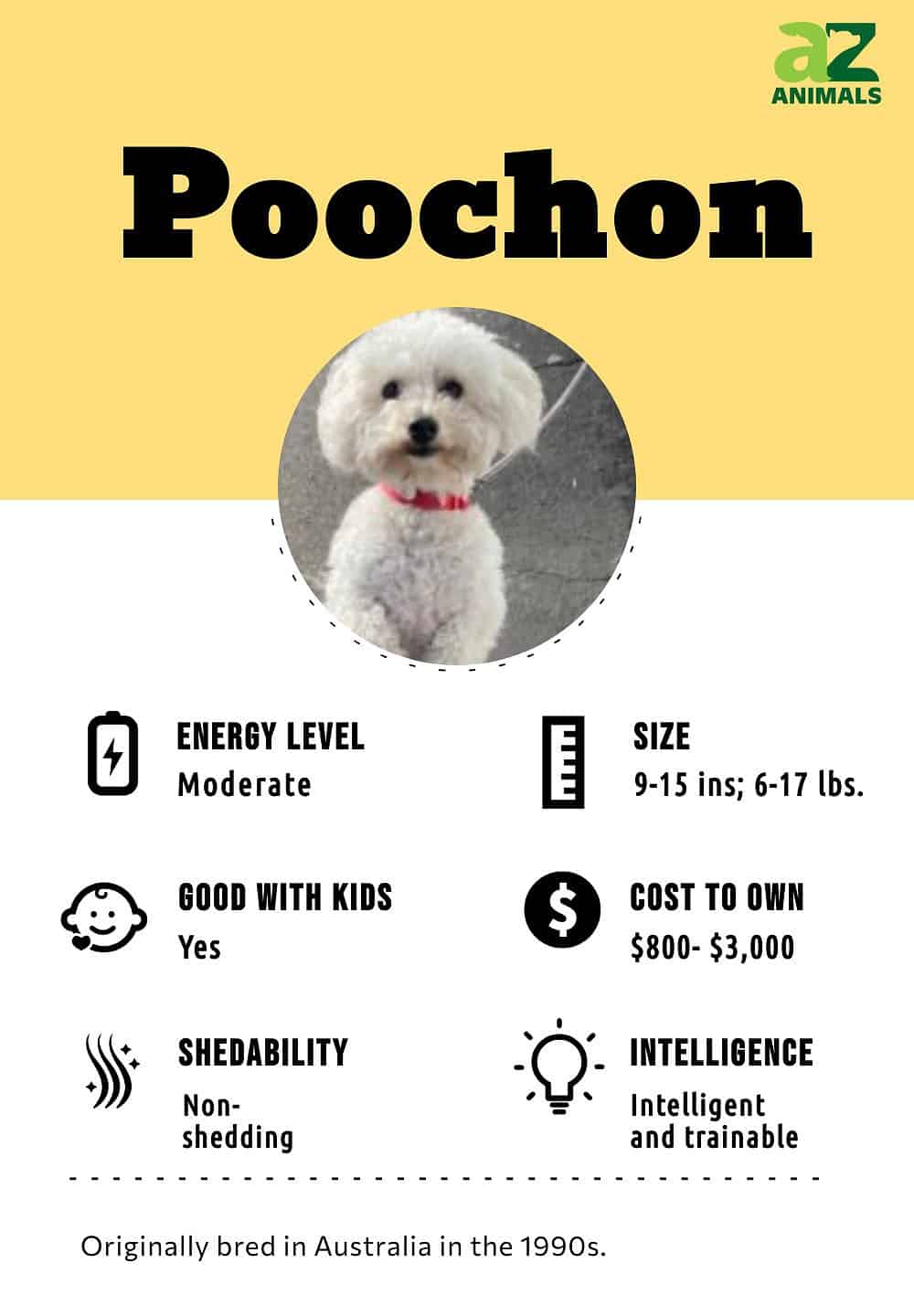
Poochons are gaining popularity as a hypoallergenic mix as both Poodles and Bichon Frisés do not shed. The exact temperament of a Poochon can vary based on the specific traits they inherit from each parent, but in general this breed is playful, loving, and friendly. Poochons were first bred in Australia in the late 1990s. It wasn’t long until breeders in the United States and the United Kingdom decided to make their own Bichon Frisé and Poodle mixes. Poochons may also be called Bichpoos, Bichon Poodles, or Bichon Poo.
See all of our expert product reviews.
Ownership: 3 Pros and Cons
| Pros! | Cons! |
|---|---|
| Friendly: Poochons are friendly dogs and do well with families and children. | Difficult to groom: Bichpoos can be challenging to groom and will often require professional grooming. |
| Apartment friendly: Poochons are more suited to apartment living than other larger or more energetic dog breeds. | Prone to separation anxiety: Poochons don’t tolerate being left alone very well and may become anxious or destructive. |
| Easy to train: Poochons are intelligent and eager to please which makes them relatively easy to train. | May be stubborn: Some Poochons may have a more stubborn personality, which could make them more challenging to own. |
Appearance
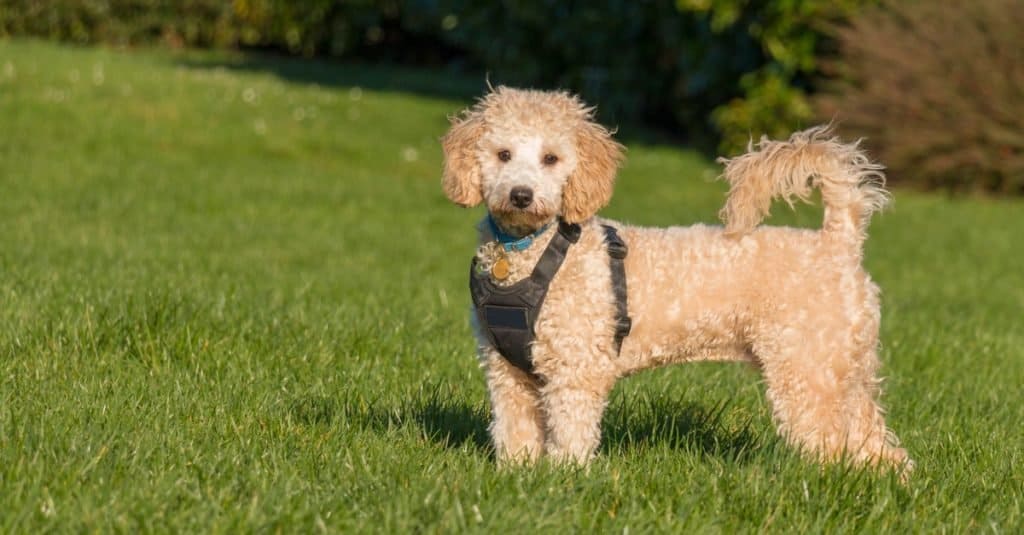
The Poochon’s medium-length coat is usually a solid color in cream, tan, or apricot.
©Radovan Zierik/Shutterstock.com
The Poochon’s coat is of medium length and generally comes in a solid cream, tan, or apricot color. Sometimes the colors are blended. Occasionally, one of this breed will be black or grey. So much about the appearance depends on which gene a pup got from which parent, but much about the appearance of the Poodle and the Bichon Frisé in terms of face, ears, tail length, and such is very similar.
Size and Weight
Poochons are a smaller dog breed. Males and females weigh between 6 and 17 pounds and are between 9 and 15 inches tall. Their exact size can vary based on whether a Miniature or Toy Poodle was mixed with a Bichon Frisé.
| Height (Male) | 9 inches to 15 inches |
| Height (Female) | 9 inches to 15 inches |
| Weight (Male) | 6 pounds to 17 pounds |
| Weight (Female) | 6 pounds to 17 pounds |
Temperament and Behavior
Each Poochon’s temperament may be a little different depending on the specific mix of traits they inherit from their Bichon Frisé and Poodle parents. In general, though, most Poochon’s have an affectionate personality. They are also very smart and enjoy playtime with the people in their family. Poochons are also very social dogs and enjoy meeting new people and other pets. They can make an excellent family dog and will also do well in homes with other dogs or cats.
Health and Entertainment for your Poochon
See all of our expert product reviews.
Bichon Poodles, however, does not like being left alone. If they are left alone for too long, they are prone to developing separation anxiety, which can cause them to engage in destructive behaviors. A Poochon may not be the right pet for you if someone won’t be able to stay home with them most of the time.
Common Health Issues
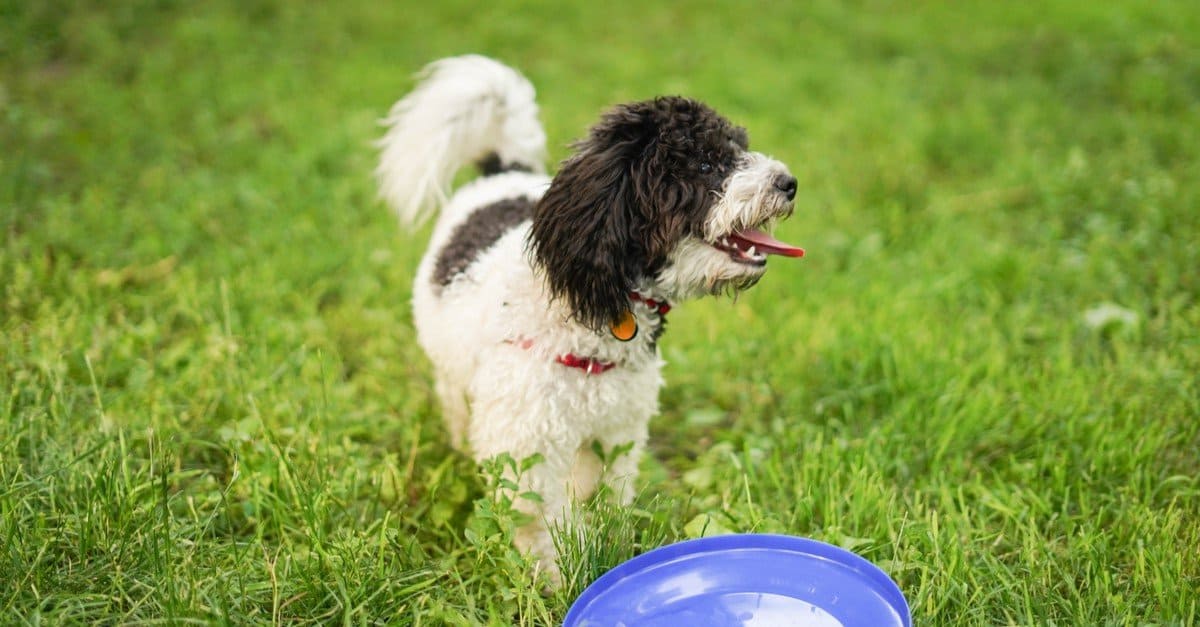
Three potential health concerns for a Poochon are allergies, patellar luxation, and retinal atrophy.
©Angela Liu/Shutterstock.com
Poochons share health concerns with their Bichon Frisé and Toy Poodle parents. While every Poochon will not develop all of these concerns, being aware of them can help you offer the best care possible to your dog.
One potential concern to look out for is allergies. Some Poochons may develop allergic reactions to foods or other items in the environment. This could lead to breathing issues or hot spots. If you suspect your Poochon is allergic to his or her food, talk to its veterinarian immediately.
Patellar luxation is another possible health concern. This is a condition where the kneecaps slip out of place as a Poochon walk. This can make walking uncomfortable and may require surgery or other treatments.
Another health concern that some Poochons face is progressive retinal atrophy. This is a degenerative disease where the retina deteriorates. It will eventually lead to blindness in a Poochon, and there is, unfortunately, no treatment for it at this time.
To review, some potential health concerns Poochons may face include:
- Allergies
- Patellar luxation
- Progressive retinal atrophy
Care
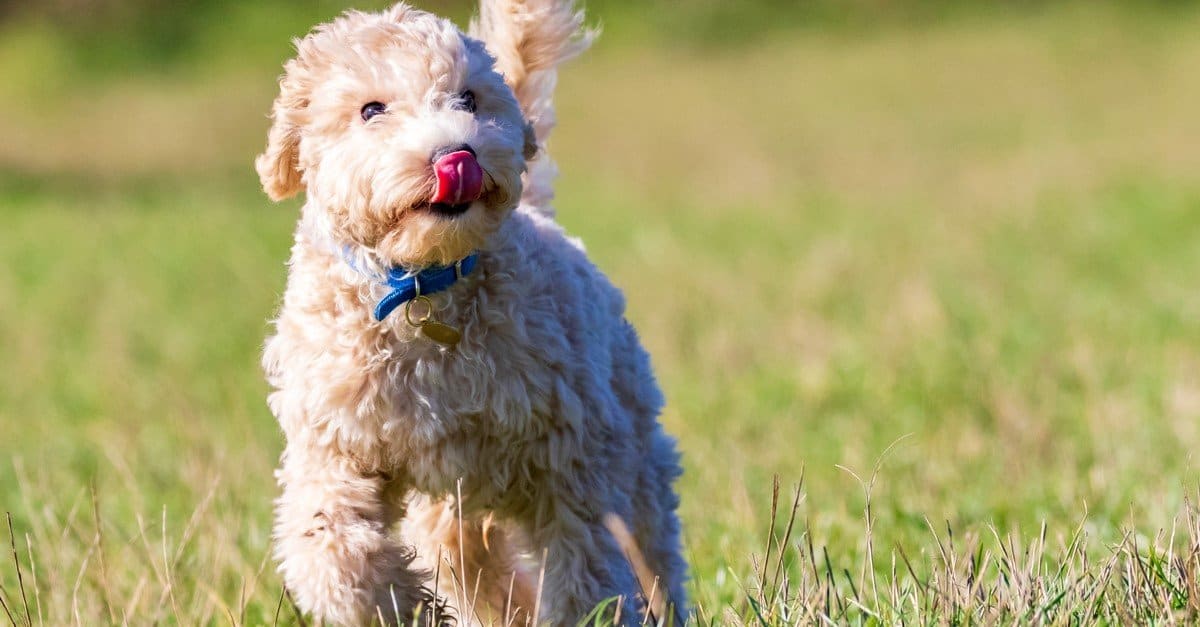
A Poochon needs to be brushed every day and groomed by a professional.
©Radovan Zierik/Shutterstock.com
Due to their unique temperament, nutritional needs, grooming needs, and other necessary care, taking care of a Bichpoo will be different from taking care of other breeds of dogs. Keep all of these considerations in mind as you prepare to care for your new Poochon.
Best Dog Food
Choose high-quality dog food from a trusted manufacturer for a full-grown dog. Look for food designed for small breed dogs with moderate to high energy levels, as these foods will best meet your Bichon Poo’s needs. These dogs can gain too much weight if they aren’t fed the correct amount of food, so consult with the serving size on the bag or your veterinarian to make sure they’re getting the right amount. Rather than leaving the food out for free-feeding all day, split the total amount into two servings.
Puppies have a smaller stomach than full-grown dogs and will require smaller meals more frequently throughout the day. Check with your veterinarian, but in general, most puppies should eat between three or four times a day until they are at least six months old.
There are a number of quality dog foods that can help dogs like Poochons that are prone to allergies. You also want a food that offers ample nutrition aimed at supporting bones and joints.
At A-Z Animals, we suggest giving your Poochon Blue Buffalo Life Protection Formula Natural Adult Small Breed Dry Dog Food.
This dog food is designed specifically for smaller dogs like Poochons. It has glucosamine and calcium for strong cartilage and joints, which is perfect to protect against patellar luxation. There’s Vitamin A and Taurine to help Poochon’s eyes, and the ingredients are high-quality, so your dog will be less likely to develop allergies.
You can get Blue Buffalo Life Protection Formula for Small Breeds here on Chewy and Amazon.
- Quality protein from chicken for maintaining healthy muscles
- Whole grains, veggies and fruit to give energy to smaller dogs
- Smaller kibble size for smaller jaws
- Promotes healthy coat, skin, and joints
Maintenance and Grooming
Since both Poodles and Bichon Frisés are hypoallergenic dogs, Poochons won’t shed either. However, since they don’t shed, their coats will require much more attention and grooming than many other dog breeds. These dogs should be brushed every day to prevent knots or matting in their hair. They will also need to be professionally groomed about once every 4 to 8 weeks.
In addition to brushing and grooming your dog, clean the area around its eyes to prevent tear stains. Their teeth should also be brushed a few times every week, and their nails should be trimmed to make sure they don’t get too long and make walking uncomfortable.
Training
Most of these dogs are easy to train. The breed is highly intelligent and eager to please. However, you will still want to start training your puppy as soon as possible as it will make training easier and more effective. Consider signing up for puppy training classes shortly after bringing your dog home.
Socializing a dog from an early age will also help him or her learn how to act in different situations. Take your puppy with you to different places and expose it to different people and pets.
Exercise
The exercise needs of these dogs can vary based on the specific traits they inherit from each parent and which type of Poodle was used for breeding. Bichon Frisés and Toy Poodles only require low amounts of exercise, while Standard Poodles have higher energy needs. In general, try to get your Bichon Poo at least 30 minutes of exercise each day, but keep in mind that their specific needs may vary. Taking a walk with your dog or playing in a fenced-in backyard are examples of ways you can help meet their activity needs.
Puppies
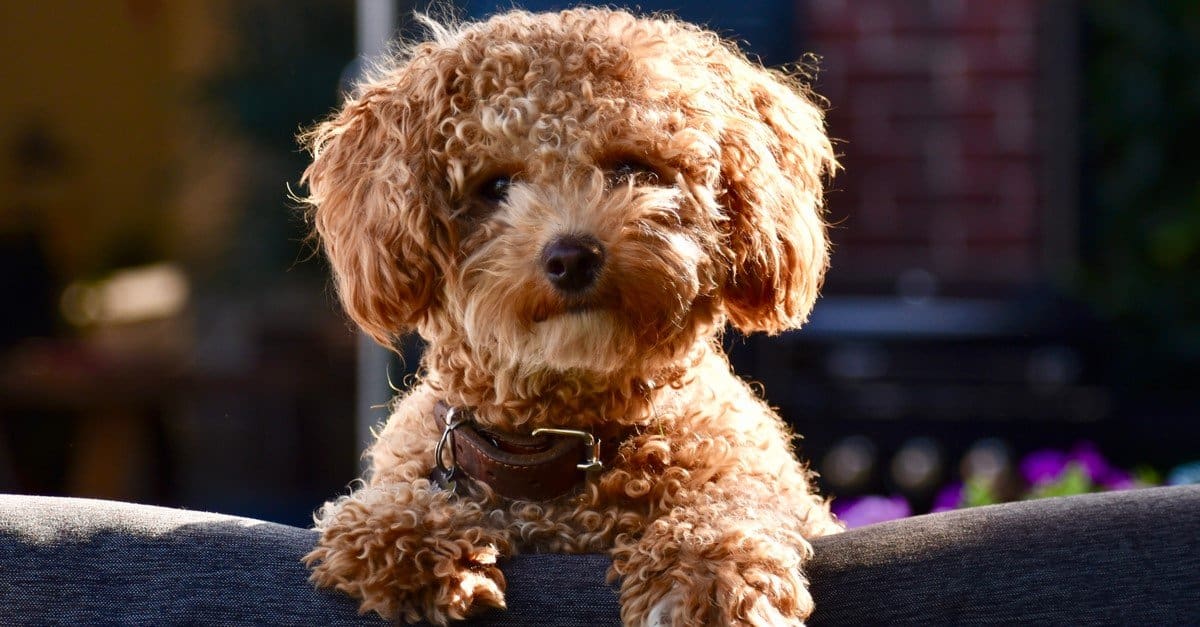
Take a puppy to the veterinarian for a check-up soon after you first bring it home, and make sure to start training early.
©Mario Korterik/Shutterstock.com
Puppies will need a safe environment in the home where they’ll be able to play and rest away from any potential hazards. Before bringing home a puppy, puppy-proof by removing anything that could potentially injure your dog as well as any personal belongings you wouldn’t want to see destroyed by a playful pup.
You’ll also need to make sure you purchase all the food, toys, and supplies your new dog will need before bringing him or her home. This will ensure that you’re prepared for the puppy when it comes home and will make the first few days significantly less stressful. Look for a veterinarian you can trust and schedule an appointment for your puppy shortly after you bring him or her home. The veterinarian can check the dog’s overall health and give you some pointers and suggestions for keeping your new dog healthy.
Children
These dogs can make a great family dog. They are very friendly and affectionate and know how to be kind and gentle with children. Bichon Poodles also can be quite playful and could make a great companion for a child. However, due to their smaller size, they may be best suited for families with slightly older children who have learned how to interact appropriately with dogs and won’t try to pull the Poochon’s tail or leg.
Similar Dogs
Maltipoos, Cavapoos, and Pomapoos are three breeds that are similar to these dogs.
- Maltipoo: Maltipoos and Poochons both have one Poodle parent. Both breeds are affectionate, social, and playful. Poochons are a bit more energetic than Maltipoos and have slightly higher exercise needs.
- Cavapoo: Cavapoos also have one parent that is a Poodle. Both breeds are intelligent and easy to train. Cavapoos are a bit larger than Poochons, though, with an average weight of around 18 pounds compared to the 9.5-pound average weight of a Poochon.
- Pomapoo: Pomapoos and Poochons are both affectionate and intelligent dogs who don’t like being left alone. Poochons are more tolerant of other dogs and cats than Pomapoos.
Famous
This is an adorable dog breed, and many people love looking at these cute dogs. Some Poochon owners have created Instagram pages for their pups and have gained a lot of followers.
- Arlo is a 3-year-old Poochon who loves spending time outdoors and with his family. He has over 600 followers on Instagram.
- Max is a Poochon on Instagram with over 700 followers. He loves eating and having fun with his family.
Popular Names
If you are looking for the right name for your dog, consider one of the following popular choices:
- Bailey
- Teddy
- Rascal
- Doodle
- Cooper
- Lucy
- Angel
- Prince
- Molly
- Minnie
Poochon FAQs (Frequently Asked Questions)
How much does Poochon cost to own?
The price to purchase a Poochon from a breeder can vary quite a bit depending on the breeder and where you live. Most Bichon Poodles will cost between $1,000 and $3,000. You may also be able to find a Poochon in a shelter or through a rescue organization. The price to adopt a Poochon will be significantly less than purchasing one through a breeder and will likely cost just a few hundred dollars.
In addition to the price to purchase or adopt a Poochon, don’t forget about the other costs associated with owning a dog. These will include veterinary care, training, food, toys, and all the other necessary supplies. The first year owning your Poochon will likely be the most expensive, and you could spend between $1,000 and $1,500, or more. For the following years, budget between $500 and $1,000 to cover your dog’s expenses.
Is Poochon good with kids?
Yes, Poochons are good with kids. They are friendly, playful, and gentle. They enjoy playing with kids or going on a walk together with the family.
How long does Poochon live?
The average lifespan of a Poochon is 12 to 15 years.
What is a Poochon?
A Poochon is a mixed breed dog that is the result of crossing a Miniature or Toy Poodle with a Bichon Frisé. Bichon Poos are very friendly and affectionate dogs that can make great family pets. They are also hypoallergenic but require professional grooming.
How big does a Poochon get?
A full-grown Poochon will weigh between 6 and 17 pounds and bet between 9 and 15 inches tall.
How do you groom a Poochon?
Poochons are a challenging dog to groom. They will require daily brushing sessions to prevent their long and curly hair from getting tangled or matted. Most Poochons will also need professional grooming to keep their coat looking its best.
Do Poochon dogs bark a lot?
Poochons are a more vocal breed and often bark a lot. However, with training and plenty of stimulation, most owners are able to decrease the amount that they bark.
Thank you for reading! Have some feedback for us? Contact the AZ Animals editorial team.
Sources
- Dog Time, Available here: https://dogtime.com/dog-breeds/poochon#/slide/1
- Animalso, Available here: https://animalso.com/breeds/bichon-poodle-mix/
- Hello Bark, Available here: https://hellobark.com/dogs/poochon/
- Woof Bark Growl, Available here: https://woofbarkgrowl.co.uk/poochon/

